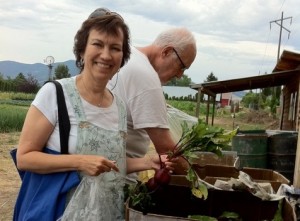 If you want to write about food — and are serious about it — there’s a workshop you don’t want to miss.
If you want to write about food — and are serious about it — there’s a workshop you don’t want to miss.
Dianne Jacob, author of “Will Write For Food: The Complete Guide to Writing Cookbooks, Blogs, Reviews, Memoir, and More” — which I love, by the way — will host a workshop for foodies, bloggers, writers and cookbook authors — really anyone who wants to write or get published — in December in Honolulu.
At “Food Writing For Food Lovers,” you’ll learn how to improve your writing, hone your restaurant reviewing skills, and acquire techniques to stand out among other would-be food writers. (To register for the workshop, click here.)
I got a chance to chat with Jacob — who grew up in Vancouver but now lives in Oakland — over the weekend to pick her brain about all things related to food writing — including, of course, food.
Cat: Food writing — who doesn’t want to do that! But how difficult is it to write about food and well?
Jacob: It’s not difficult to write about food from a place of passion and enthusiasm. But to do it well, you need to understand how it’s cooked, its history, its variations and other details that bring depth to your work. Not to mention an ability to tell stories and evoke emotion from readers.
Cat: With social media sites like Yelp and free blogging platforms, everyone seems to be a food critic. But what sets the true food writers apart from the others? And how can you stand out from the masses?
Jacob: The best food critics study food and write about it in context. If they’re reviewing saimin, for example, they understand how it’s made, who the premier chefs are, and what defines an outstanding bowl. And fundamentally, they are wiling to say whether it’s any good and why, without using vague terms like “amazing.” You can stand apart from others if you have a sense of curiosity and enthusiasm, and you love to learn.
Speaking of food criticism, study the work of Jonathan Gold to see a genius at work. He is the only food writer in history to have won a Pulitzer.
Cat: There’s this idea that food writers and/or critics should be trained in the culinary arts. Or, at very least, have worked at an Applebee’s. Can anyone be a food writer?
Jacob: I don’t agree with that, when it comes to restaurant critics. Reviewers represent the consumer. I suppose it’s good if cookbook authors have attended culinary school. However, doing so creates distance from the home cook. While anyone can be a food writer, some of the best ones have taken cooking classes, at a minimum, and worked at restaurants.
Cat: How did you get into writing, blogging and then doing both about food?
Jacob: I started writing at a young age because my father, an amateur poet and songwriter, wanted my sister and me to become writers. I graduated from journalism school twice, and one of my first jobs was editing a restaurant magazine in Vancouver. I continued writing restaurant reviews on the side while working at other publications. When I became self-employed 16 years ago, I started freelancing for magazines and websites, writing profiles of chefs and cookbook authors, writing cooking columns with recipes, and writing feature articles. I started blogging because I wanted to update “Will Write for Food” with a new big chapter on food blogging. I figured I couldn’t really write about blogging without understanding what bloggers went through, so I started a blog 2.5 years ago.
Cat: Who are your inspirations?
Jacob: Ruth Reichl is a lyrical writer. I have watched her reinvent herself as a restaurant reviewer, magazine editor, memoirist, and editor. Jonathan Gold is a thrilling read because of his voracious intelligence and research. GQ’s Alan Richman and Anthony Bourdain can be wickedly funny but in remarkably different ways.
Cat: What do you love about your job?
Jacob: I love working with people to improve their writing or helping them with a book proposal and then seeing their work published. I enjoygiving writing assignments to students who say they can’t write and then blow my mind with the pieces they read out loud in my classrooms. I love to travel to conferences where I meet so many new and aspiring writers. And I love it when people tell me they’ve read my book, Will Write for Food, or my blog, and say how much they have enjoyed them. That’s so satisfying!
Cat: Do you consider yourself a foodie? And what in the world does that mean?
Jacob: Oh yes. Someone totally obsessed by food, no matter what kind, high or low. It’s not the best term, but it’s the one that people understand.
Cat: You’re coming to Oahu to conduct a workshop. Who should attend? And what will they get out of it? (And will there be food?)
Jacob: I can’t wait to come to Honolulu. This class will be great for foodies, bloggers, writers, cookbook authors who want to start a blog, chefs, caterers, and culinary students. They will learn about writing, how to write a blog that stands out, how the publishing industry works, and how to write a great review. I am not sure yet about the food.
Cat: I just got your book, “Will Write For Food,” from Amazon. What are some books you’re reading now?
Jacob: I just finished reading Tomatoland, Barry Estabrook’s chilling expose of the treatment of tomato workers in Florida. I’m dipping into Cook’s Illustrated new cookbook of 2000 recipes. That thing could be a doorstop! It’s full of invaluable cooking techniques. And I’ve got Oranges by John McPhee on my nightstand. Maybe I’ll bring it with me on the plane.
Cat: Where are your favorite places to eat in Hawaii? And how is our local cuisine different from anywhere else?
Jacob: I love the little places for plate lunches, the shave ice stands, and anything covered in li hing powder, especially pineapple. I can’t wait to get my hands on lomilomi, manapua, and poke. I grew up eating crack seed, and it cracks me up (get it?) that K-Mart sells so many varieties. I can’t wait to hit the farmer’s markets and see what’s new. I always stay in a condo so I can cook.
Hawaiian food is such a mashup of the food of many cultures — Chinese, Philippine, Japanese, Portuguese — and that’s what I love about it. It ranks as a definitive American cuisine along with the foods of the South, the Pacific Northwest, Texas, and the Eastern Seaboard.
*****
Jacob is the author of “Will Write for Food: The Complete Guide to Writing Cookbooks, Blogs, Reviews, Memoir, and More” and co-author of “Grilled Pizzas & Piadinas.” She speaks at conferences around North America, teaches in the San Francisco Bay Area, and coaches writers privately in the United States, Canada, Asia and Europe. She writes a blog, Will Write for Food. Before becoming self-employed she was a newspaper, magazine and book editor in Canada and here in California.



3 Comments
It’s fun to hear about this side of Dianne. Great interview! I’m excited to see you both… soon!
This is a great interview…so glad to read more about Dianne and her thoughts.
[…] of Cooking With Amy suggested some contacts; Catherine Toth, a prominent Honolulu food writer, interviewed me; the Hawaiian president of Les Dames Escoffier told members about the class and invited me to pupus […]